Expert Interview: Sjoerd Stok on the Spyderco Stok
Sjoerd works as a Content Marketer and Product Specialist at Knivesandtools. Recently, he added 'Spyderco designer' to his list of achievements! He designed the Spyderco Stok series, a series consisting of two compact fixed knives for everyday use. So, how did he end up working with Spyderco?
Tell us a little about yourself
I'm Sjoerd, I'm 27 years old, and I was born and raised in Deventer, the Netherlands. For the past 5 years, I've worked at Knivesandtools as Content Marketer and Product Specialist for the Pocket Knives & Multi-tools category. Before this, I went to AKI ArtEZ University of the Arts in Enschede, where I graduated from the Fine Art programme. In my free time I was already running an Instagram account about knives. After graduation, I came into contact with Knivesandtools through this hobby, and I ended up applying for a job.
How did this collaboration between Spyderco and yourself come to be?
Every year, Spyderco hosts the Amsterdam Meet. This is usually right before the IWA Outdoor show, when they're already travelling from the USA to Germany, which is where the IWA is held. The Spyderco Meet is a meet-up for knife enthusiasts and Spyderco, where they present the latest production models and prototypes not normally shown to the wider public. It was at one of these Meets, in 2018, that I gave my design and concept to Eric Glesser. Eric Glesser is the son of Spyderco's founder Sal Glesser. At the time, my design was only two pieces of cardboard glued together, shaped like the knife I envisioned. It was simply meant to give an impression of the size and ergonomics. In late 2019, I unexpectedly received an email that Spyderco had made two 'working' prototypes of the design. Fast-forward five years to 2023 and the Spyderco Stok was born!
We know you're a big fan of Spyderco's pocket knives, so why did you choose to design a fixed knife?
I designed the Spyderco Stok in 2018, shortly before I started working at Knivesandtools. At the time, I was in art school and looking for a fixed blade for everyday use. When you are finger-deep in paint, constantly opening packages, a fixed blade shines in its simplicity and accessibility. A fixed knife requires less maintenance than a pocket knife with hinged parts where dirt, paint and tape residue can get stuck inside the mechanism. That's why I chose to design a fixed knife.
The Spyderco Stok is available with a bowie blade and drop point blade. Why did you choose these blade shapes?
Most fixed knives were too large for me, or unsuitable for an urban environment. As a knife enthusiast and Spyderco collector, I asked myself the question: what would the perfect fixed blade Spyderco knife look like to me? With that in mind, I designed the Stok.
I quickly discovered that the perfect blade shape, for me, does not exist. If you choose a thin flat grind, you compromise on the toughness of the blade. If you choose a thick scandi edge, you would crush the apple you're trying to peel. So why choose only one blade shape, when you can just as easily choose two? And you can just choose which one you want to carry, depending on the day ahead of you.
The drop point/sheepsfoot blade shape with its high and thin 'full-flat-ground' blade is perfect for opening packages and peeling fruit. The bowie version is ideal for demanding cutting tasks, thanks to its strong tip and 'saber-ground' blade. This is because with this type of sharpening, there is some 'meat' behind the cut, making the blade a bit more robust. So which of the two you choose for the day depends on what you are planning to do. Since I find myself opening a lot of packages, I often prefer the drop point version. However, when I go out in nature, or don't know what the day will bring, I usually take the Bowie version with me. For both knives, I drew inspiration from classic Traditionals. The classic pocket knives your grandfather used to own. The sheepsfoot-style blade shape, for instance, came from my fondness for traditional swayback knives. Sleek gentleman's knives with a straight edge and a downward, blunt tip.
For the handle, you chose to use OD Green G10 with a subtle texture. Why?
I originally designed the Spyderco Stok to be a premium-quality fixed knife. When Spyderco told me they'd prefer to add the knife to their budget-friendly range, that meant the handle material would be made from G10. This material is also used on knives like the Spyderco Tenacious. I didn't consider this a problem. Far from it, actually, as I'm a big fan of G10. It's a lightweight material and the finish is very sleek. Although I should add that a micarta handle would also make for a cool version in the future!
The subtle texture, which Spyderco calls a 'peel-ply' texture, is standard for most Spyderco knives with a G10 handle. It's grippy, but not coarse. I had more of a say when it came to the colour of the G10 handle. Normally, Spyderco uses black G10 for their budget line. Since it is important to me that the knives have a friendly look, I suggested green G10. A nice, friendly-looking colour, and not a lot of contrast to the blade. Also, I think that many people will carry the Stok as a back-up outdoor knife, so green is a colour you can't go wrong with.
Why did you choose a Boltaron sheath instead of a leather one?
Boltaron is perfectly suited for sleek and compact sheaths. The thin design allows you to wear the Stok comfortably on the inside of your trousers or under a T-shirt with a neck cord. Or carry it in your pocket, next to or even behind your wallet. With a fixed knife that’s intended for everyday use, it's important that you're able to carry it comfortably. With a leather sheath, this is more difficult because it is often thicker. In addition, Boltaron is the more sustainable choice. It has a significantly longer lifespan and is very resistant to external influences. This is not always the case with leather.
What target audience did you have in mind for the Spyderco Stok?
The Spyderco Stok is perfect for anyone looking for a compact fixed knife for everyday use, without spending too much money. With its small size and friendly looks, the knife lends itself better to an urban environment than most fixed knives. Also, its low weight of only 100 grams makes the Stok an excellent choice for those looking for an effective back-up blade. While hiking, for instance. Or to carry in addition to your larger bushcraft or survival knife. In short: the Stok is for everyone!
What can we expect from you in the future?
I don't have any active design projects at the moment. Although, in the future, I'd love to design a cool and even smaller minimalist fixed knife. To me, the beauty of a knife is found in its simplicity, and I am always drawn to the 'less is more' principle: a term used by the early modern German Bauhaus movement.
Depending on the popularity of the Spyderco Stok, a premium or Sprint-Run version might also be on the cards. This is something I discussed with Eric Glesser and others from the Spyderco team, but no definitive plans are on the table yet. I think that would be very cool, because it would take the knife closer to the initial concept of a premium fixed-blade knife. Just imagine... A Magnacut-steel blade, polished micarta handle with coloured liners... Fingers crossed!

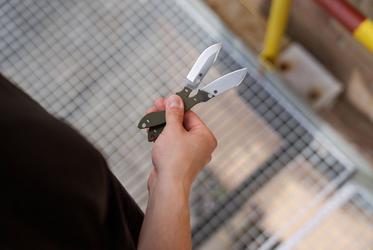
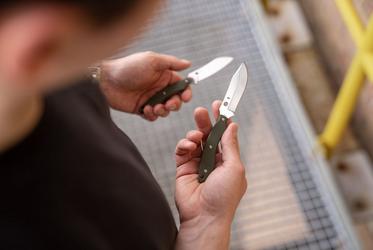
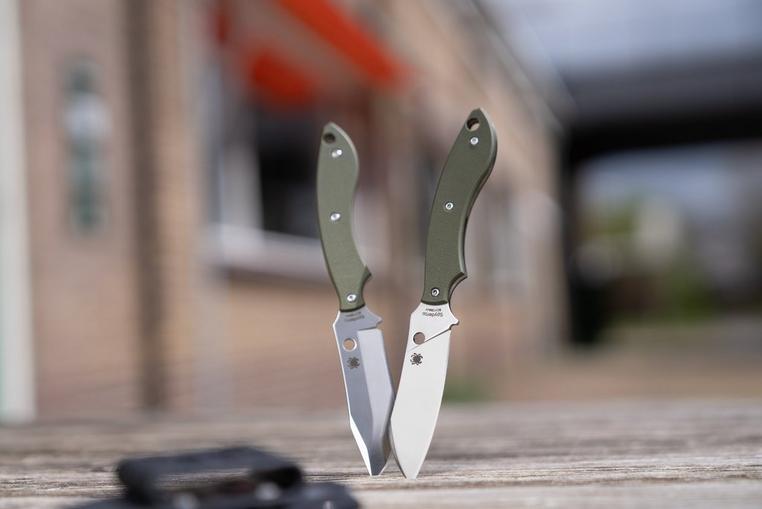
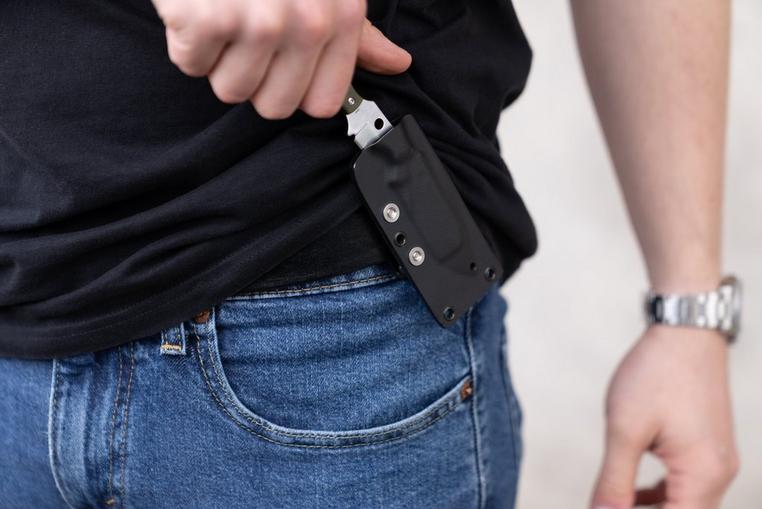
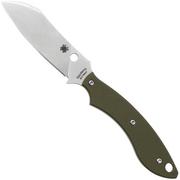







?%24center=center&%24poi=poi&%24product-image%24=&fmt=auto&h=500&poi=%7B%24this.metadata.pointOfInterest.x%7D%2C%7B%24this.metadata.pointOfInterest.y%7D%2C%7B%24this.metadata.pointOfInterest.w%7D%2C%7B%24this.metadata.pointOfInterest.h%7D&scaleFit=%7B%28%24this.metadata.pointOfInterest%29%3F%24poi%3A%24center%7D&sm=c&w=1208)


